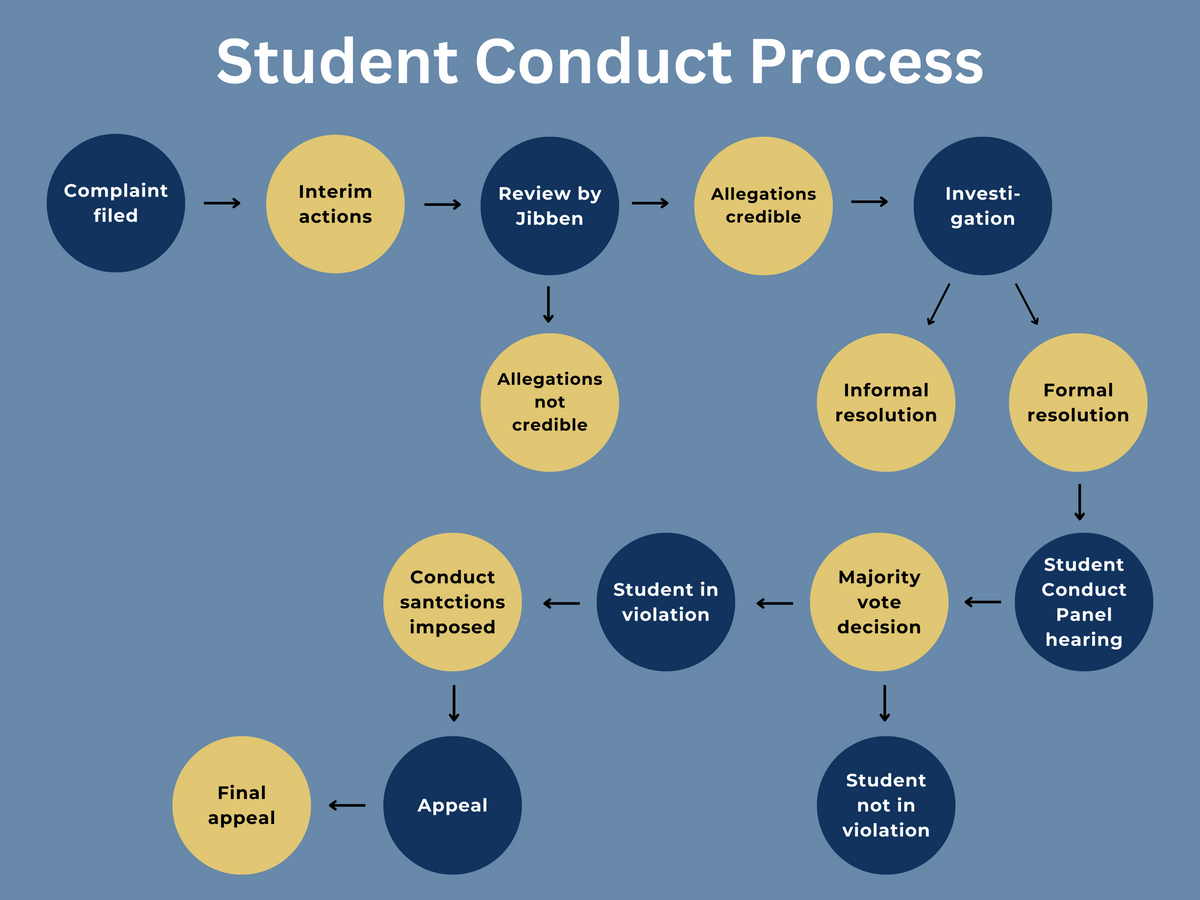Student Code of Conduct receives revisions

The Student Code of Conduct underwent a major revision over the 2023 summer that included expanding the amnesty policy, clarifying confusing language and improving its accessibility.
Revision began in February 2023 when Whitney Jibben, assistant dean of students for community standards, began reading through the Student Code of Conduct and making minor adjustments.
“We dug in very deeply in June, essentially starting to put things in place, and then it was implemented around the second week of August,” Jibben said.
The Student Code of Conduct is a portion of the handbook that specifies the community standards Augustana students are expected to uphold.
“It provides a roadmap for students to make good choices and it helps us create a respectful learning environment and a community where people feel safe and happy,” Acting Dean of Students Checka Leinwall said.
In July, Jibben attended the Association for Student Conduct Administration’s 2023 Gehring Academy. Jibben said discussions were largely focused on what a student code of conduct should include and how to best implement those practices.
“It’s essentially a five-day, intensive training for people who oversee universities to be trained by other people who are seasoned professionals,” Jibben said.
When she returned, Jibben applied what she learned at the institute to the Augustana community.
“What we went through here on campus was essentially to go through line-by-line in the code of conduct to decide what needed to be kept, what language was outdated and what we expect from our students,” Jibben said.
According to Jibben, one of the biggest changes to the code of conduct occurred in the medical amnesty policy.
“It used to be very specific, stating that students who sought medical assistance for drug or alcohol [related issues] would not be held to disciplinary action,” Jibben said.
At the training, Jibben heard from other universities who were expanding their policies to include full amnesty. The full amnesty policy goes beyond violations specific to drugs and alcohol to apply to situations where Title IX or emergencies with overnight guests may be involved.
“The new policy applies to any situation where there may be a potential policy violation but there is a greater risk of safety and or security,” Jibben said.
Restorative practices have also undergone revisions.
Prior to this summer, fines were a common practice in the conduct process. For example, a student could have been fined for violating a residence hall policy in the final week of the semester or if they did not complete an assignment. However, those have been removed to make a more equitable system for all students.
“We’ve taken fines out of the process because if you cannot afford a fine, that’s not teaching you anything. And if you can afford a fine, that doesn’t necessarily change your behavior either,” Leinwall said.

According to Jibben, the fines have been replaced with more intentional restorative practices, such as reflection papers, mediations, apology letters and thank-you notes.
“We really want to focus more on if you affect your community. We want you to reflect on…what affected the community based on that behavior and how can you either restore the community back to a safe and healthy place or how can you move forward,” Jibben said.
Junior Annie Johnston, an Augustana Student Association senator, supports the removal of the fines process.
“I do appreciate the change of discarding the financial dues. That does place barriers on students financially and that should not be a punishment at Augustana for alleged violations of the Student Code of Conduct,” Johnston said.
Augustana also implemented a new online platform named Judicial Educator to allow students to navigate the conduct process virtually.
“As Augustana has expanded particularly our online platforms, like the Doctorate of Physical Therapy, we had to make sure that we were also including ways that we could do outreach for conduct if we had students that weren’t studying on campus that were found in violation of the policy,” Jibben said.
According to Jibben, online modules — similar to Alcohol Education or Title IX training — get assigned to students who, for example, are found in violation of the alcohol or tobacco policies. Students then move through the module before passing a test at the end.
“It allows the student to do it in the time that makes sense for them. It also allows them a little more anonymity versus going to a course and kind of having to expose yourself as someone who has violated a policy,” Jibben said.
Jibben and Leinwall also clarified the conduct process itself. The Student Code of Conduct now says Augustana community members have 10 school days after the incident to file a complaint against a student. After receiving the report of alleged misconduct, the student conduct officer has 15 days to notify the involved students.
“We really wanted to refocus a lot of the language that we used and a lot of clarifying that process so that it feels more like an educational opportunity and an understanding and agreement versus a law that you broke and punishment,” Jibben said.
Additionally, students are now able to appear in front of a conduct panel rather than a single conduct officer. The panels would include a group of trained faculty and staff who review a student’s conduct when called into question.
Johnston believes this panel should include students, as well as faculty and staff.
“I would like to encourage this revamped ‘Conduct Panel’ to include student voices,” Johnston said. “We offer a crucial perspective that may be missing when just including staff and faculty members.”
Finally, according to Jibben, the largest goal of the revisions was to make it more accessible for students.
“As you were reading through the Student Code of Conduct, a lot of the language was very judicious and litigious, and that’s just not accessible to the normal student, nor is it very inclusive of populations that we have here on campus,” Jibben said.
Jibben also partnered with Jeffrey Merkle, director of accessibility services, to ensure that students with documented disabilities receive the same accommodations they get in the classroom when they are in the conduct system.
“That was definitely really important to us and it was exciting to collaborate with him on that,” Jibben said.
Moving forward, students can expect the Student Code of Conduct to be reviewed every summer.
“We are talking about incorporating assessment in the calendar so that it just sort of becomes a natural part of what we do,” Jibben said.



